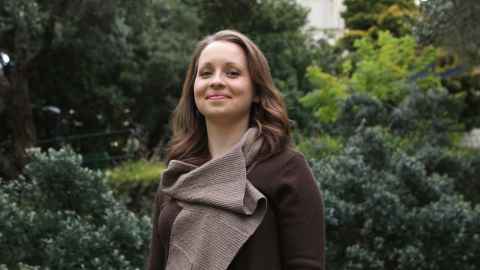Take 10 with... Erin Leitao
Dr Erin Leitao from the School of Chemical Sciences gives us 10 minutes of her time to discuss her research about new methods of making long chains of atoms.

1. Describe your research topic to us in 10 words or less.
Creating the materials of the future.
2. Now explain it in everyday terms!
I am working on understanding and developing efficient ways to make bonds between earth abundant atoms, with the eventual aim to translate these new methods into making long chains of atoms (polymers). These materials will have unique properties.
3. Describe some of your day-to-day research activities.
Typical research activities including discussing ideas and results with my students, talking with technicians and collaborators, and writing grants.
4. What do you enjoy most about your research?
I really enjoy working with other people and brainstorming ideas about research. It is also amazing to discover something new and to hold the world’s supply of a particular compound or material – because you just made it for the first time.
5. Tell us something that has surprised you in the course of your research.
Small modifications make big changes! For example, the addition of a methyl group (CH3) on a catalyst can result in a 100-fold increase in reaction rate, while substituting a hydrogen (H) for a methyl group on a substrate can convert an insoluble material into one that is soluble.
6. How have you approached any challenges you’ve faced in your research?
Any time I run into a challenge I read lot of papers, and if that doesn’t help, I talk to other people (colleagues, supervisors, mentors, and students) to get new ideas.
7. What questions have emerged as a result?
New research avenues have resulted from some of the challenges faced in my research. I am really curious to know how and why reactions operate in the way they do, and when we uncover new ways to link atoms together we also try to determine the intimate details of the process involved. In my career so far, I have even taken this curiosity to other areas of chemistry that I have been lucky to be exposed to (e.g. nanomaterials).
8. What kind of impact do you hope your research will have?
I hope that one day my research leads to a material that we will all use and that we can manufacture here in New Zealand and sell to consumers internationally.
9. If you collaborate across the faculty or University, who do you work with and how does it benefit your research?
I have developed some beneficial collaborations in the School of Chemical Sciences (e.g. Professor Christian Hartinger, Associate Professor Tilo Söhnel, Dr Dan Furkert), which have broadened my knowledge base, increased the scope of my research and improved my research impact. I have also had some great conversations with colleagues in the faculty but there are no active projects underway – yet! [InSCIde Scoop note: We love a good cross-faculty collab... Keep us in the loop Erin!]
10. What one piece of advice would you give your younger, less experienced research selves?
Don’t be so focused on answering the ‘big’ questions, or even the first question posed in your research as there is a vast amount of knowledge to be learned along the way. When you get stuck, talk about it and collaborate with the experts who can help!